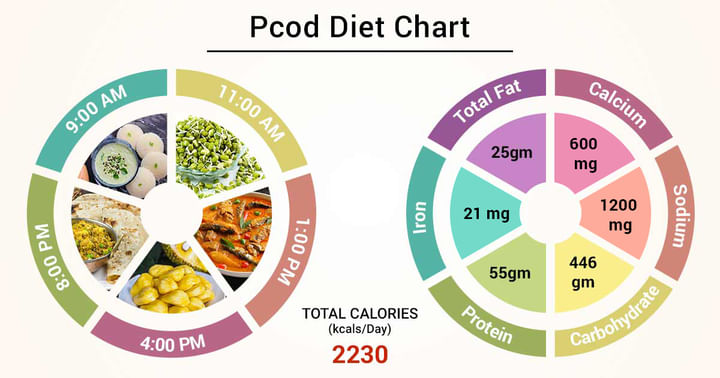Diet Chart For Polycystic Ovarian Disease (PCOD)
Last Updated: Dec 05, 2022
About
'Polycystic ovary syndrome' is a problem in which a woman's hormones are out of balance. It can cause problems with your periods and make it difficult to get pregnant. PCOS also may cause unwanted changes in the way you look.
If it isn't treated, over time it can lead to serious health problems, such as diabetes and heart disease. Most women with PCOS grow many small cysts on their ovaries. That is why it is called polycystic ovary syndrome.
Early diagnosis and treatment can help control the symptoms and prevent long-term problems. Changing the way you eat can help you manage the symptoms much better.
Consumption of certain types of foods may aggravate the symptoms of the disease. Hence, staying away from refined flour, sugar, dairy products and carbohydrates help to greatly reduce insulin imbalance and associated symptom occurrence. Replacing such foods with raw fruits, green leafy vegetables and foods with a low glycemic index help to maintain the nutrition value and also aids weight loss. Foods that have a high GI result in a quick rise in blood sugar levels. Insulin levels follow suit to deal with the glucose in the blood stream. Generally, high GI foods have been processed to remove fibre and other nutrients so they may be tasty but they are high in calories while lacking in nutrients. Green, leafy vegetables have the most nutrients per calorie than any other food. They are rich in iron, calcium, potassium, and magnesium, as well as vitamins K, C, E, and many of the B vitamins.
Vitamin B in particular plays a vital role in managing PCOS symptoms. This is also worth a further discussion so I will write a separate post for it. Here are just some of the things that Vitamin B is responsible for: sugar and fat metabolism, thyroid function and hormone balance, amongst others. It plays a vital role in the management of PCOS.
Diet Chart
| Sunday | |
| Breakfast (8:00-8:30AM) | 4 Idli + Sambar 1/2 cup/ 1 table spoon Green chutney/ Tomato Chutney |
| Mid-Meal (11:00-11:30AM) | green gram sprouts 1 cup |
| Lunch (2:00-2:30PM) | 3 Roti+1/2 cup salad + Fish curry ( 100 gm fish)+ 1/2 cup cabbage subji. |
| Evening (4:00-4:30PM) | 1 Portion fruit(Limit the intake of high energy fruits. Eg: Banana, Jack fruit,Mango, Chikku.) |
| Dinner (8:00-8:30PM) | 2 Roti / chappati.+ Tomato subji 1/2 cup. |
| Monday | |
| Breakfast (8:00-8:30AM) | 2 Slice brown bread.+1 slice low fat cheese+2 Boiled egg white. |
| Mid-Meal (11:00-11:30AM) | 1 Portion fruit(Limit the intake of high energy fruits. Eg: Banana, Jack fruit,Mango, Chikku.) |
| Lunch (2:00-2:30PM) | Veg pulav rice 1 cup+ 1/2 cup Soya Chunk curry+ 1/2 cup Butter Milk. |
| Evening (4:00-4:30PM) | 1 cup light tea+ 2 wheat rusk. |
| Dinner (8:00-8:30PM) | 2 roti/ Chapathi+ Ladies finger subji 1/2 cup. |
| Tuesday | |
| Breakfast (8:00-8:30AM) | Chappati 3 + 1/2 cup Potato green peas curry. |
| Mid-Meal (11:00-11:30AM) | 1/2 cup boilled black channa |
| Lunch (2:00-2:30PM) | 1 cup rice+ 1/2 cup Dhal+ Palak subji 1/2 cup+ 1/2 cup low fat curd. |
| Evening (4:00-4:30PM) | 1 Portion fruit(Limit the intake of high energy fruits. Eg: Banana, Jack fruit,Mango, Chikku.) |
| Dinner (8:00-8:30PM) | Brocken wheat upma 1 cup+ 1/2 cup green beans subji |
| Wednesday | |
| Breakfast (8:00-8:30AM) | Methi Parata 2+ 1 tbs green chutney. |
| Mid-Meal (11:00-11:30AM) | 1 Portion fruit(Limit the intake of high energy fruits. Eg: Banana, Jack fruit,Mango, Chikku.) |
| Lunch (2:00-2:30PM) | 1 cup rice+ chicken curry( 150 gm chicken+ 1 cup cucumber salad. |
| Evening (4:00-4:30PM) | 1 Cup light tea+ Brown rice flakes poha 1 cup. |
| Dinner (8:00-8:30PM) | Wheat dosa 3 + 1/2 cup Bitter guard subji. |
| Thursday | |
| Breakfast (8:00-8:30AM) | Vegetable Oats Upma 1 cup+ 1/2 cup low fat milk. |
| Mid-Meal (11:00-11:30AM) | plane Yoghurt with raw vegetables / grilled vegetables -1 cup |
| Lunch (2:00-2:30PM) | 1/2 cup rice + 2 medium chappati+1/2 cup Kidney beans curry+ Snake guard subji 1/2 cup. |
| Evening (4:00-4:30PM) | 1 cup boilled channa+ light tea 1 cup. |
| Dinner (8:00-8:30PM) | 2 Roti/ chapati+ 1/2 cup mix veg curry |
| Friday | |
| Breakfast (8:00-8:30AM) | Mix veg Poha 1 cup+ 1/2 cup low fat milk. |
| Mid-Meal (11:00-11:30AM) | 1 Portion fruit(Limit the intake of high energy fruits. Eg: Banana, Jack fruit,Mango, Chikku.) |
| Lunch (2:00-2:30PM) | 3 Chappati+ 1/2 cup cluster beans subji+ Fish curry(100g fish) 1/2 cup. |
| Evening (4:00-4:30PM) | 1 cup tea+ + 2 biscuits ( Nutrichoice or Digestiva or Oatmeal.) |
| Dinner (8:00-8:30PM) | 2 Roti / chappathi+Ridge guard subji 1/2 cup. |
| Saturday | |
| Breakfast (8:00-8:30AM) | Utappam 2+ 1 tbs green chutney. |
| Mid-Meal (11:00-11:30AM) | 1 cup boilled channa |
| Lunch (2:00-2:30PM) | 1 cup rice+ Soya chunk curry1/2 cup+ Ladies finger subji 1/2 cup+ small cup low fat curd. |
| Evening (4:00-4:30PM) | 1 Portion fruit(Limit the intake of high energy fruits. Eg: Banana, Jack fruit,Mango, Chikku.) |
| Dinner (8:00-8:30PM) | Brocken wheat upma 1 cup+ 1/2 cup green beans subji |
Do's And Dont's
Do's
- Gradually increase the intake of high fiber carbohydrates.
- Emphasize lean protein foods.
- Include mono unsaturated and omega 3 fatty acid foods.
- Include different fruits and vegetables.
- Drink minimum 2 liter water.
- Do regular exercise.
Dont's
- Do not skip meals.
- Don't take heavy meals at a time.
- Avoid processed juices and soaft drinks.
- Avoid deep fried foods.
Food Items You Can Easily Consume
- Cereal: Brown rice, whole wheat, oats, jowar, bajra, ragi
- Pulses: red gram, green gram, black gram, bengal gram
- Vegetables: all gourds-bitter gourd, snake gourd, ridge gourd, bottle gourd, ivy gourd, ladies finger, tinda,green leafy vegetables
- Fruits: citrus fruits-orange, mousambi, grape fruit, lemon; berries-strawberry, blueberry, black berry; cranberry, cherries, papaya, pineapple, guava.
- Milk and milk products: low fat milk, low fat curd.
- Meat,fish & egg: Skin out chicken, egg white, fish like salmon, sardines, trout, mackerel, tuna.
- Oil: 2 tsp (10ml)
- Sugar: 2 tsp (10gm)
- Other beverages: green tea
References
- Marsh KA, Steinbeck KS, Atkinson FS, Petocz P, Brand-Miller JC. Effect of a low glycemic index compared with a conventional healthy diet on polycystic ovary syndrome. The American journal of clinical nutrition. 2010 Jul 1;92(1):83-92.
- Kasim-Karakas SE, Almario RU, Gregory L, Wong R, Todd H, Lasley BL. Metabolic and endocrine effects of a polyunsaturated fatty acid-rich diet in polycystic ovary syndrome. The Journal of Clinical Endocrinology & Metabolism. 2004 Feb 1;89(2):615-20.
- Douglas CC, Gower BA, Darnell BE, Ovalle F, Oster RA, Azziz R. Role of diet in the treatment of polycystic ovary syndrome. Fertility and sterility. 2006 Mar 1;85(3):679-88.
- Marsh K, Brand-Miller J. The optimal diet for women with polycystic ovary syndrome?. British Journal of Nutrition. 2005 Aug;94(2):154-65.
Table of content
Find Dietitian/Nutritionist near me
Ask a free question
Get FREE multiple opinions from Doctors



